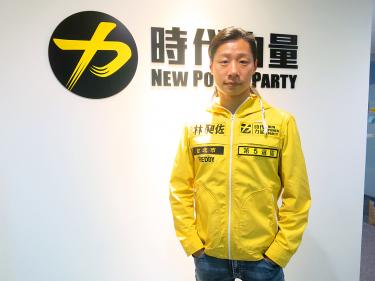The frontman of the heavy metal band Chthonic, Freddy Lim (林昶佐), has channeled his anger at corruption into action. He intends to effect change from the inside out by running for office in Taipei’s Wanhua (萬華) and Zhongzheng (中正) districts under the banner of the the New Power Party (NPP), which he founded.
In an interview, Lim recently outlined his party’s campaign platform and described his commitment to promoting independence, justice and fairness.
Pointing to his diverse campaign team, Lim said he has established a team drawn from different age groups and all walks of life, because he wanted a campaign that could directly engage the public and “would not pay lip service to justice and fairness.”
Lim has been an ardent advocate of human rights and Taiwanese independence since he was in his 20s and was elected chairman of Amnesty International’s Taiwan branch in 2012. He made a feature movie about Taiwan’s bid to join the UN during Chthonic’s overseas tours in the US and Europe in 2007.
Unlike most politicians, Lim said he hoped that media attention would not only focus on him, but also to other members of his team.
They include Wu Cheng (吳崢) and Lai Pin-yu (賴品妤), who gained prominence during last year’s Sunflower movement; veteran Taiwanese independence advocates such as Wang Cheng-chung (王正中), the former chairman of the Goa-Seng-Lang Association for Taiwan Independence; and even musicians who had never heard of Academia Sinica researcher and Sunflower movement leader Huang Kuo-chang (黃國昌) before joining the group, Lim said.
“Do you know what ‘destruction of the constitution’ and ‘government corruption’ mean?” Wu recalled asking musicians on the team.
Many civil groups and politicians often churn out catchphrases that they think sound impressive, but whose meaning might be lost on the general public, Wu said.
Some of the team members did not even know who Huang was, which, Wu said, serves as a reality check that the team has to come to terms with when face-to-face with voters.
When brainstorming for a media release, the team’s campaign writers usually rule out all abstract, vacant slogans that elude their less politically savvy teammates, he said.
Lim, who exudes confidence when he performs onstage before big crowds, said he had an attack of stage fright the first time he tried to solicit votes at a traditional market.
Surrounded by housewives who were busy bargaining as they picked out food, he said he felt out of place.
However, thanks to his stint as a judge in a TV talent show a year ago, he found that he has won a fanbase among housewives and was greeted with a hearty welcome in the market, Lim said.
Some of the women cried out his name in English, with an adorable Taiwanese accent, or called him “teacher Chthonic,” he said.
Other bystanders looked indifferent, but that did not faze him, Lim said.
He approached then, looked them in the face, shook their hands and gave them a clear but succinct 30-second explanation of his campaign platform, he said.
“Most people get scared at first, but they would listen to you and let you finish,” Lim said, holding Wu’s hand to demonstrate.
“Freddy was a real nuisance. He stuck to me even in the dead of the night,” Wu said, recounting Lim’s persistence in recruiting him, with the singer calling him three times every day without fail, as well as any time he came up with a new idea to convince him to join the team.
Wu said he and his girlfriend, Lai, were surprised by Lim’s tenacity and often ignored his messages. However, impressed by Lim’s perseverance, the two finally decided to join his team.
Lim said that justice and fairness are the two tenets that underline everything he believes in, such as human rights, environmental protection, cultural policies, Taiwanese independence and transitional justice.
The Chinese Nationalist Party (KMT) is very experienced in exploiting these two concepts, he said, adding that he hopes to engage the public by linking justice and fairness to issues that have immediate interests to the public.
“Many senior politicians told us not to tackle the issues of homeless people and urban renewal” in Taipei’s Zhongzheng and Wanhua districts, Lim said.
However, he believes that no household who refuses to relocate should be stigmatized as saboteurs of urban renewal by interested parties.
Instead, the government should come up with a mutually acceptable solution, he said, referring to a recent case in which a household in Zhongzheng District refused to move because of the owner’s belief in feng shui.
“My life is [committed to] next year’s [legislative elections],” Lim said, adding that the elections are pivotal to the nation’s development in the next decade.
He called for opinion leaders in every field to stand up and fight, to ensure that the KMT would, for the first time in history, lose its majority in the legislature.
“[Leaders] should not excuse themselves [from participating in the elections] or simply stump [for the NPP] to preserve their political capital. Please join us in making an effort,” Lim said.
Source: Taipei Times - 2015/06/26





















